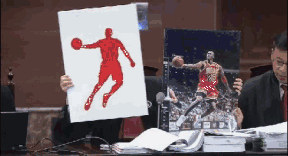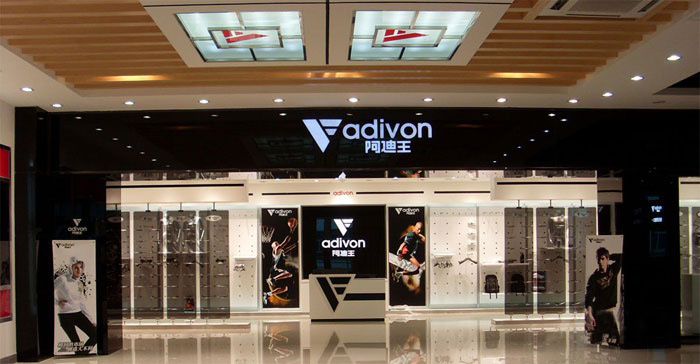On April 24, Guangzhou Intermediate People’s Court made a judgment in the trademark dispute case against the American sporting brand New Balance. According to the court’s judgment, the Chinese affiliate of the US company New Balance, New Balance Trading (China) Co., Ltd. has violated the trademark rights of others by using a trademark already registered as “New Balance” in China and thus has been ordered to pay 98 million RMB in compensation. This is allegedly the highest fine that the court has ever levied in an intellectual property case.
In recent years, trademark dispute cases have attracted an increasing amount of attention from the society at large.
Such cases of trademark squatting mostly occur when small, weak, and unknown companies want to expand quickly on the market and decide to use a popular brand name for their publicity. This reflects how small businesses in China are taking the “free ride” to gain instant success and quick profits.
1. Jordan Sports
Jordan Sports Co., Ltd., located in Jinjiang, Fujian province, has registered a series of brands such as “Jordan” and various forms of the Chinese transliteration “Qiao Dan”. Because of the name’s similarity to that of basketball star Michael Jordan, and because its trademark bears a silhouetted figure making a dunk shot that is similar to a photo taken of Michael Jordan in 1997, the brand is been believed to be referring to the famed basketball player. Jordan has considerable market share in smaller cities due to its low price. In 2010, its sales revenues hit over 2.91 billion RMB, and it even sought market listing.

2. Adivon

In 2006, orginally a small shoe factory, founded Adivon Sporting Goods (China) Co., Ltd., Adivon has been called “Copycat King” by some netizens, given the similarity of its trademark to that of the internationally renowned Adidas. More ridicule has appeared online through such slogans as “If you wear shoes, wear Adivon” and “Adivon is the knock-off king”.
Even so, Adivon has tenaciously clung to life in the face of adversity. During the London Olympics, Adivon sponsored Syria, Lesotho and Côte d’Ivoire, placed ads on the Mango TV channel, sponsored Guo Jingming’s movie Small Times, and made inroads into the NBA. Although it has a bad reputation in major Chinese cities like Beijing, Shanghai and Guangzhou, it is rapidly grasping market shares in third and fourth-tier cities. By the end of 2012, Adivon’s annual profits had already exceeded 1 billion RMB, opening more than 3,000 stores nationwide.
3. Jiangsu Orion
Orion was started in 1956 as one of Korea’s four major food companies. In the mid-1990s, Orion entered the Chinese market, registering as two legal entities—Orion Foods Co., Ltd., and Orion Foods (Shanghai) Co., Ltd. Relying on its brand name “Orion Pie (Chocolate Pie)”, 20 years after Orion entered the Chinese market, its sales have exceeded 1 trillion Korean won. However, in Lianyungang, Jiangsu province, there are two companies with the name Orion. One of these, called the Jiangsu Orion Foods Science and Technology Co., Ltd., focuses mainly on seaweed, seafood products, legumes, puffed foods, convenience foods, and other snacks. The other is called Jiangsu Orion Realty Development Co., Ltd.
In many cases, trademark squatting occurs when famous foreign brands failed to register their trademarks in China in time, leading some individuals to purposefully attempt to make money off of the delay.
1. BV
In the case of the Italian luxury brand Bottega Veneta (BV), the transliterated name in China, “Baoti Jia” (宝缇嘉), was also subject to trademark squatting. In 2013, the company was forced to register under a new name in China, Baodie Jia, making it seem as though the original brand-name product was actually the cheap knock-off.
2. Land Rover
Land Rover (路虎) is a well-known SUV brand, whereas its original Chinese name (陆虎 ) was registered by Chinese automobile manufacturer Geely in 1999. Geely claimed that the reason it registered Land Rover’s original Chinese trademark was because it had thought it was about to acquire Land Rover, not anticipating that its acquisition plan would fail and Land Rover would be acquired instead by India’s Tata Group.
It is worth noting here the renaming frenzy for automobile companies in China. Many automobiles on the Chinese market have changed their names, to the point where it almost seems like an addiction. Take the Toyota Land Cruiser, for example. In the span of just a little more than 10 years, Toyota took great pains to register five trademarks for Land Cruiser in China. But apart from the name commonly heard, “Ludi Xunyangjian”, the rest give nothing but puzzle – LandeKeluzha, Landekeluze, Landekuruze and Landekuluze – what exactly are these?
Others have said that the original Chinese trademark for Lexus, “Lingzhi”, was changed to “Leikesasi” due to trademark squatting. In that instance, the rumor was not true; the trademark “Lingzhi” was already owned by Toyota. On June 8, 2004, Akio Toyodo explained the name change to “Leikesasi” thus: “The name change was not because of trademark squatting, but because Lexus wanted to build a new luxury car image in China. ‘Leikesasi’ sounds more like a global brand name, making it easier for Chinese consumers to remember the Lexus brand.”
3. Crayon Shin-chan
Crayon Shin-chan was an animated series developed by famous Japanese manga artist Yoshito Usui. Childhood memories of the fun and adorable character Shin-chan are cherished by an entire generation of young adults in China. But the path toward trademark development for Crayon Shin-chan was full of twists and turns. In 1997, Guangzhou Cheng Yi Optical Co., Ltd. registered the trademark “Crayon Shin-chan” in China for its clothing, footwear, and luggage, along with nine other products. After transferring the trademark, it is now used by the Jiangsu Garments Crayon Shin-chan Co., Ltd., located in Xiangcheng District of Suzhou. Another well-known case of squatting using this trademark is the food industry’s Crayon Shin-chan (Fujian) Foods Industry Co., Ltd. This company, listed on the Hong Kong stock exchange in December 2011, mainly engages in jelly-based snack food production and sales. In its 2012 annual report, it reported that its market share of jelly products in China had risen to 12%, ranking second in the industry.
Coping Methods for Foreign Companies
The fate of the several companies discussed above was not ideal. Adivon’s Chinese trademark and logo were transferred free of charge to Adidas, and are no longer permitted to appear in retail stores. Jordan Sports was taken to court by Michael Jordan. Although Jordan Sports won the case, its subsequent stock listing and international development both went badly. Jiangsu Orion Foods Science and Technology Co., Ltd., was also taken to court for trademark infringement and unfair competition and was given a deadline by which it must change its corporate name.
As China’s economy continues to grow at a rapid pace, an increasing number of foreign brands are beginning to pay attention to China’s market development. It is thus inevitable that they will run into problems when registering their Chinese language trademarks. Foreign companies need to take care of Chinese trademark registration early, so that they can avoid future disputes by being better prepared prior to the product’s release in China.
As for the trademarks that have already been infringed, they can replace the name with a new one. The benefit of this is that they can save a bit of money. The disadvantage is obvious; the public is familiar with one brand name, and if it suddenly changes, even though the product remains the same, this might still influence sales performance. Or the company can purchase the original trademark from the trademark holder in China. But they will definitely need to spend a great deal of money to do so, as was the case for Apple in 2012, when it purchased the trademark “ipad” from the Shenzhen company Proview for a sum of US $60 million. Or, when faced with trademark squatting, companies can also take the case to court and fight for their legal rights.
UWS provide trademark registration service to clients in a professional and timely manner.



